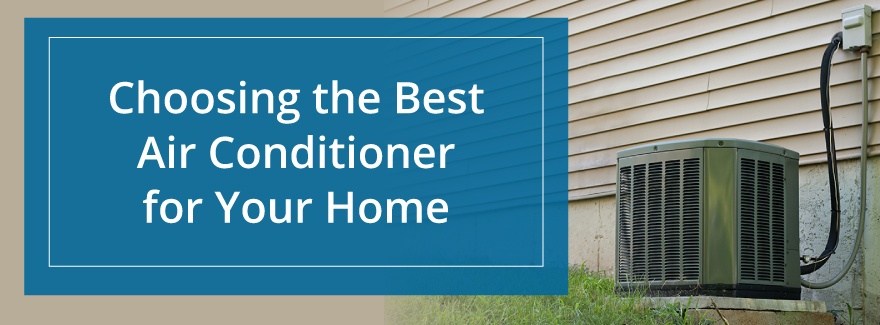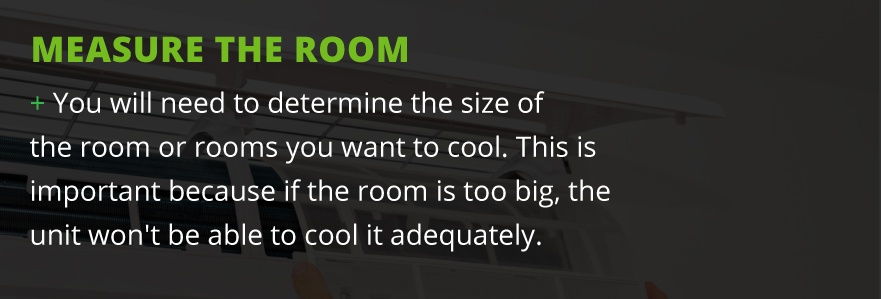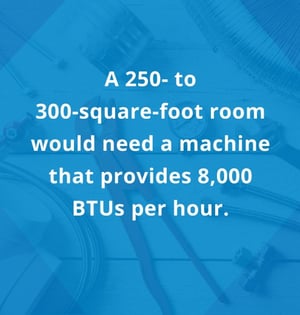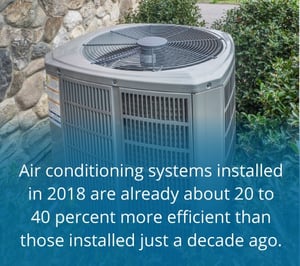
You need air conditioning.
Maybe the window units you've been using don’t provide enough cooling anymore or your older air conditioning system isn’t giving you the cooling power you want. Perhaps you’ve decided to equip your house with a central air conditioning system. Deciding what system to use, how much cooling power you need and how much energy efficiency can you afford are all important questions.
And you want to take your time making that decision, especially if cost is an important factor. For instance, don’t base your decision on size alone, as in the bigger the unit the more cooling you will get. Buying a machine that’s too big is just as unfortunate as buying one that’s too small. You will pay more than you need to, and not get as much air conditioning as you think you might.
When you take the time to do some research about the air conditioning unit you wish to purchase and how much cooling you actually need for your home, it will save you money and provide a better and more comfortable environment.
How Many Different Types of Air Conditioners Are There?
Before you buy an air conditioner, it’s important to know the different types of air conditioners. To reiterate the point we made above, do some research on just how much cooling your home requires. Are you looking for climate control for one or two rooms or an entire house?
Remember that air conditioners serve three basic purposes:
- They make a room or house cooler.
- They take moisture out of the air.
- They filter dust, pollen and other irritants out of the atmosphere.
Now let’s take a look at the different kinds types of AC units:
- Window air conditioners: Ideal for use in individual rooms. They cost a lot less and are relatively easy to install. This is the type of air conditioner often used in student rooms, some motels and smaller apartments.
- Portable air conditioners: Again, this is ideal for someone who is trying to cool one room at a time. They can be a bit more of a nuisance than window units because they often have reservoirs that require you to empty them regularly. They can also weigh a lot, making them hard to move from room to room, which undermines their main advantage.
- Central air conditioning: This is the model used in most modern homes and most often features a split system. Split systems use a condenser placed outside the home and a fan and coil system inside, with the refrigerant circulating between the two. The refrigerant also acts as a dehumidifier. The cooler air is then blown through ducts around the home.

Another form of central air conditioning is the split ductless system. Technically it’s not central air but it does provide cooling in relatively the same manner. It is more difficult in some homes, especially older homes, to build a system of ducts. With a split ductless system, you still have an outside condenser but you have one or several blower units inside the house, depending on how much of the home you want to cool. These are placed high on the wall and connect to the condenser with tubing. The refrigerant is also circulated with this tubing. Like window air conditioners, they can be used to cool individual rooms and each unit has its own controls. They are more expensive than the window models and if you are going to use a ductless system, it’s a good idea to have it professionally installed.
With this in mind, your first task is to decide how much of your home you want to air-condition. Do you rent rather than own your own home? Or perhaps you only want to cool one or two rooms. In both of these cases, a window air conditioner is probably the best answer. You will need to determine the size of the room or rooms you want to cool. This is important because if the room is too big, the unit won't be able to cool it adequately. On the other hand, an overpowered unit might make the room feel damp and clammy.

How Do I Estimate the Size of a Room?
You'll want to determine a room's square footage:
- If it's a square room, multiply the length of the room by its width.
- If it’s a triangular room, multiply the length by the width and divide it by two.
- If the room has a more complicated shape, subdivided it and measure it in squares and triangles. Then you can use the formulas above to get the room's square footage.
 Why do you need to know this? This will help you determine how much cooling power is needed in each room. Cooling power, even in the United States, is measured in British thermal units (BTUs) per hour. It’s a number that tells you the speed and effectiveness of any air conditioner. Here are some examples:
Why do you need to know this? This will help you determine how much cooling power is needed in each room. Cooling power, even in the United States, is measured in British thermal units (BTUs) per hour. It’s a number that tells you the speed and effectiveness of any air conditioner. Here are some examples:
- A 250- to 300-square-foot room would need a machine that provides 8,000 BTUs per hour.
- A 550- to 700-square-foot room would require 14,000 BTUs per hour.
- A really big room, around 2,000 or 2,500 square feet, would require 34,000 BTUs per hour. (If you’re tackling a room this big, it’s time to think about moving up from window air conditioners.)
You can find a more extensive chart of square footage and BTUs at the Energy Star website. Here are another few tips for buying the proper window air conditioners:
- If the room you want to condition is shaded, reduce the BTU number by 10 percent.
- In a very sunny room, increase the BTU number by 10 percent.
- If you’re air-conditioning a room for you and your significant other or your roomie at college, add an additional 600 BTUs for each person.
- If you’re putting the window air conditioning unit in the kitchen, add an additional 4,000 BTUs.
- Think about noise. Window air conditioners can be quite noisy. Talk to the sales associate about quieter models that are available on the market these days. Spending the extra few dollars for a quieter air conditioner could go a long way toward improving your enjoyment of your cooler room.

What Do I Need to Know If I Want to Air-Condition My Entire House?
If you know you’re going to be living in your current house for more than a few years and you want to cool the entire house and not just a few rooms, central air conditioning is the best option.
Buying a lot of window air conditioners does not make sense. True, purchasing central air conditioning may cost more initially. Using several window air conditioners to cool an entire house is not as efficient, has higher energy costs, makes a lot more noise and doesn't cool as well as a central air conditioning system. And when you install central air, you also improve your home’s value so that when the day comes to sell, you’ll be able to ask more.
If you’re going to install central air "from scratch" you need to work with a professional contractor. Basically, someone who knows what they’re doing when it comes to air conditioning. This contractor will be able to calculate the BTUs you’re going to need and how much it would cost to put in a duct system if you don’t already have one. The contractor can also determine if the ducts used in an older home are the proper size and in the correct locations for the best results.
 Your contractor should be able to answer all your questions about these factors:
Your contractor should be able to answer all your questions about these factors:
- Size: Just like window air conditioners, you need to determine how many BTUs per hour you’re going to need to cool your entire house. Your professional contractor will have methods that provide this information, but you can get an idea by visiting the Energy Star website for a guide on how many BTUs per hour are needed per square foot.
- Efficiency: Time to learn about the Seasonal Energy Efficiency Rating, or SEER. Air conditioning systems installed in 2018 are already about 20 to 40 percent more efficient than those installed just a decade ago. The minimum SEER rating for a split central air conditioning system installed this year is 13. An air conditioner with a SEER rating of 13 is 30 percent more efficient than an older machine with a rating of just 10. Remember: the higher the number, the more efficient the air conditioner and the lower your energy costs will be.
- Maintenance: Think about your air conditioner like it’s an airplane. Airplanes need to be inspected regularly to make sure they're in good working order. Air conditioners need to be inspected regularly as well. Parts will need to be repaired, coils cleaned, filters changed, blower units vacuumed, etc.
- Thermostats or Control Units: Even if you’re using a split system with ducts, you still want to be able to control how cool it is in each room. If you know you’re going to spend more time in the kitchen and the living room but less time in the basement or guest bedrooms, you cool each accordingly. It's another way to save money and lower your costs. Also, think about using ceiling fans. They can help a room feel several degrees cooler, which means you don’t have to turn up the air conditioning as high.
- Variable-speed blowers: Some days you can cool a room more easily than other days. A variable-speed blower allows you to cut your electricity consumption and still keep the room at a constant coolness.
- Fan-only option: This is ideal for the spring or the fall. You can still circulate the air and keep a room cool without using air conditioning.
- Change filter light: Filters need to be changed regularly in order to use your air conditioner efficiently. People don’t always remember, however, to change their filters on a regular basis. Many systems include a filter indicator change light to help you remember it’s time.
- Insulation: A poorly-insulated house can cause as many air conditioning problems as an inefficient condenser. You may be able to purchase a smaller machine if you take some steps to better insulate your house. This may require a few extra dollars up front but will return many benefits in the long run. Ask your contractor for his or her thoughts on improved insulation.

If you’re not installing a new central air conditioning system but instead replacing an AC unit, don’t assume you can just replace your current unit with a duplicate system. For example, over the past decade, many people have improved their homes' energy efficiency by installing better windows. You may not need as much cooling power in a new system as you had in your previous one. On the other hand, if you’ve added an extension to the house, such as a new guest bedroom or an in-law suite, you’re going to need more BTUs then you had in the past.
Your contractor will also be able to advise you about your duct system and whether it needs to be resized, replaced or sealed better than it currently is. The contractor will also recommend the best system to use, because with a split system the indoor components and the outdoor components usually need to come from the same manufacturer. Otherwise, you’re asking for trouble in terms of compatibility and performance.
How do I find the right contractor?
An important question as well, especially if this is your first time installing a central air conditioning system in your home. You need to do the same due diligence you would do with any other aspect of improving your home:
 Ask people you know: If anyone in your neighborhood or your family, or perhaps at your work, have had an air conditioning system installed recently (as in a year or two) ask about the experience they had with the contractor they used.
Ask people you know: If anyone in your neighborhood or your family, or perhaps at your work, have had an air conditioning system installed recently (as in a year or two) ask about the experience they had with the contractor they used.- Use the internet: With technology, you can screen contractors online. There are several different services that provide references and ratings. You want to find at least three contractors you can call and get a quote.
- Do a background check: Ask each contractor to show you their bonding and insurance documents. Again, you can check online or contact the Better Business Bureau to see what other people think of them. Ask about certifications by trade organizations. It may seem time-consuming, but picking the right contractor is as important as picking the right air conditioning system.
- Ask for specific information: Ask about what method they’re using to calculate the number of BTUs you will need. Good contractors will be able to give you a room-by-room breakdown and will be more than happy to share those with you in document form. Watch out for contractors who say things like, “I prefer the eyeball test when I’m figuring out how much cooling a room needs.”
What’s All This Going to Cost Me?
This is always a key factor in any decision involving improvements to your home. The cost for the purchase and installation of a central air conditioning unit depends on several factors, many of which we have mentioned above:
- The size of the unit based on the number of BTUs needed.
- The layout of each room in your house.
- Is it an upgrade or new install?
- Do you already have ducts in your house that can be used for air conditioning?
- How much will you pay the contractor?
There is no good way to calculate an average for all these factors. It can depend on whether you live in an urban or rural setting or even what part of the state. The website ImproveNet provides some guidance in this area. It calculates the average national cost in 2018 to be about $4,830. Meanwhile, Home Advisor says it is closer to $5,340.
This is why you need to get quotes from several contractors in order to find the best system and installer for your particular needs.
Read the Fine Print
All air conditioning units come with warranties. Before you purchase any unit, find out about its warranty and make sure you understand what it offers. Pay attention to its terms and conditions and whether or not there are any restrictions or time limits. Warranties can differ greatly from one manufacturer to the next. Some warranties cover the entire unit under one set of terms while others will offer different warranties on different components of the unit.

Also, ask about labor costs. Some warranties include them and others don’t.
We understand that reading a warranty is like reading the phone book. Your eyes can glaze over after a while. Regardless, not knowing or understanding an air conditioner's warranty can result in substantial extra costs in the future.
An Environmental Question
For many years air conditioner refrigerants were composed of ozone-depleting CFCs. In 1996 they were replaced by hydrochlorofluorocarbons — or Freon, as it is better known.
For the past two decades, it’s been the preferred refrigerant for cooling residential homes. But it, too, pokes holes in the ozone, so in 2010 the manufacture and import of Freon, or R–22, began to be phased out and will be completely gone by 2020. Since the production of Freon has been greatly diminished over the past eight years, it’s become more expensive.
If you have an older system, it’s going to cost you a bit more to get it recharged. Fortunately, manufacturers offer air conditioners in 2018 that are much more ozone-friendly and operate with a collection of new ozone-friendly refrigerants. Your contractor can tell you more about the issue and how you'll want to deal with it.
Choose Smart Touch Energy to Provide Yearly Maintenance for Your Air Conditioning Unit
If can get warm in New England and the mid-Atlantic states in the summertime. During those times, you want your home's air conditioning to be in perfect working order. When you choose Smart Touch Energy for maintenance on your cooling system, the highly-trained technicians who work with our local partners can make sure your machine is ready for any hot day.
But don’t wait. You don’t want to find out that your air conditioning is not working properly when the temperature hits 90° and you need that cool air. It’s always a good idea to do an annual air conditioning checkup in the spring before the days start to get really warm. It's the best way to discover any problems that can be fixed early and make sure your system is running smoothly and efficiently.

When you choose us to perform preventive maintenance on your air conditioning system, our local partners will make sure you are ready for anything summer has to throw at you. Your home will be cool and comfortable and your family will be, too. Even your wallet will thank you — an efficient air conditioning unit means lower electrical costs even during very hot days.
If you’d like to know more about our air conditioning tune-up services, send us an inquiry and we’ll be in touch as soon as possible.



